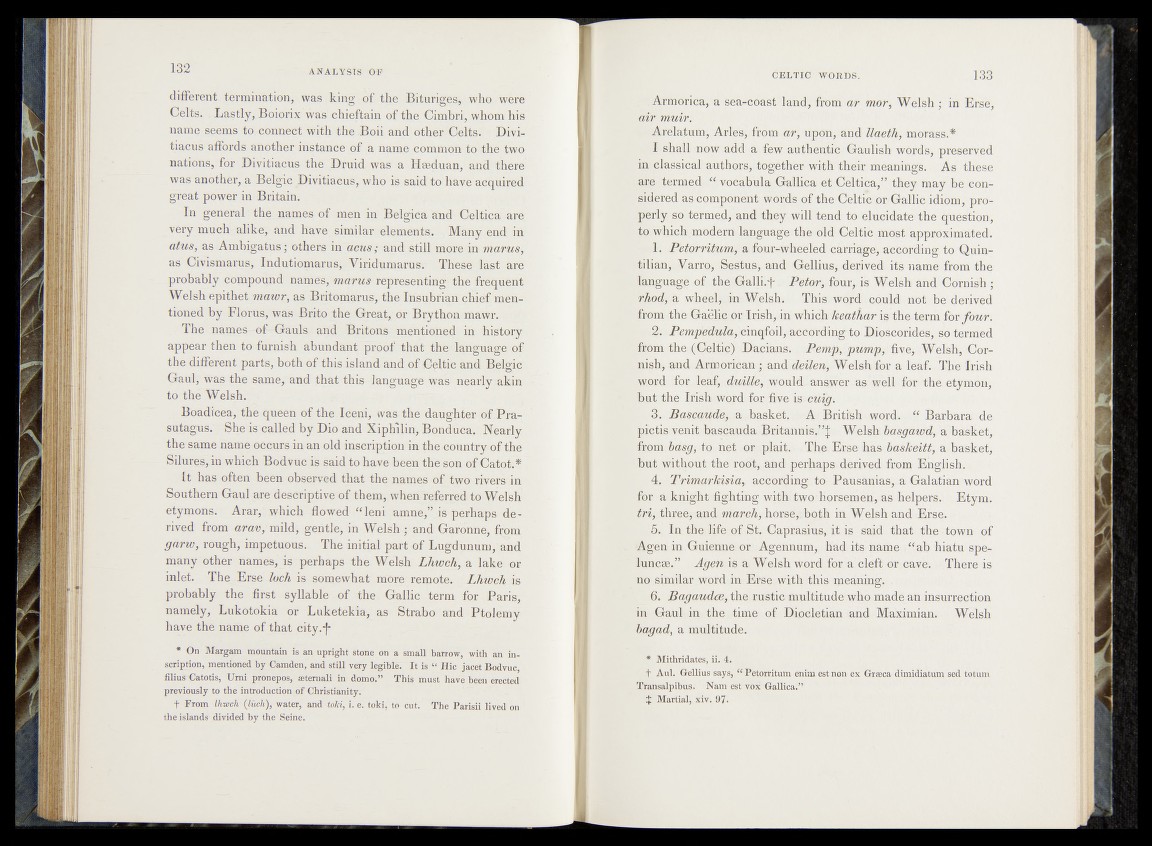
different termination, was king of the Biturig.es,;, who. were
Celts. * Lastly, Boiorix waS‘ chieftain of the Cimbri, whom liis
name seems taconnect with the ,Boii and othéf£6 èlts( Divi-
tiacus affords -another instance of a name c|^Hiöi¥tö .the twö,
nations, for Divitiacus the Druidvwas a Heeduan, and there
was another, a. Belgic Divitiacus, who' is said' to have acquired
great power in Britain.
In general ; the- names of men in Belgica and Celtica-are
very much alike, and have similar ^elements. M any n
atus, as.Ambigatus; Others in acus; and still more in mams,
as Civismarus, Indutiomarus, Viridumarus; These last are
probably compound names, mams- representing' the frequ'ént
Welsh epithetynawr, as Britoma'rus, the Insubrian chief mentioned
by Floras, was Brito the Great, or Brython rfiawr.
The names --of • Gauls, and Britons mentioned in history
appear then to ftirnish abundant proof that the language^of
the different parts, both of this,island and of Celtic and Belgic
Gaul, was the same, and that this language was nearly akin
to'the Welsh. -
Boadicea,.the queen of the Iceni, was the daughter of Pra-
sutagus. She is called by Dio and Xiphilin, Bonduca' .Nearly
the same name occurs in an old inscription in the country-of the
Silures, in which Bodvuc is said to have been thejson ofCatetc*
It has often been observed that the names of two rivers in
Southern Gaul are desPriptive o f them, when referred to Wblsh
etymons. Arar, which flowed “ leni amne," is perhaps de -
rived from arav, mild, gentle, in Welsh; and Garonne, from
garw, rough, impetuous. The initial part of Lugdunum,’and
many other names, is perhaps the Welsh Lhw ch ,^ lake or
inlet. The Erse loch is somewhat more remote. .Lhwch is
probably the first syllable of the Gallic term for Paris,
namely, Lukotokia or Luketekia, as Strabo and Ptolemy
have the name of that city.*f*
* On Margam mountain is an upright stone on a small barrow, with an in-
scription, mentioned by Camden, and still very legible. I t is “ Hie jacet Bodvuc,
filiuS-Catotis, Umi pronepos, setemali in domo.” This must have been erected
previously to the introduciipbJBf Christianity.
f From Ihwch' (inch), water, and told, i. e. toki, to cut. The Parisii lived on
the islands divided by the Seine.
sjlAfrraorica, la n d ^ ^m ar mor, Welsh ,• in Erse,
Mvr rriuir.
a r , aHn&iM&eih, morass.*
,shai^feo,w add a GahJ^#l|', words, preserved
in toldsisk'-al authors',IffgeMei^^kth^r^meanings'. $ As these
are 't e rm e ^ ^ p ^ b u l ^ ^ ^ f ^ ' dt£,Cel1pi*a)&they may;,ffilipnthe
Celtic or ^ lftijd ^ i6m,'-pro-
"«erljMftermed/and thc^fn ill^-end‘to eluqid^ifMleQuestion,
to whichvmoderri Ii^j^uaSgevtl)c?old C e ltic p ^ d s t^ ^ tQ ^ ^ a te d .
1. PetorritvmgaK fopr-\\ hoeled^caniagef, a:ceordiiap:td';C^uin-
fe ia n , ,AJarrp^.estus, aljd^fi'Sjelliii^de^iv^dts name',from thp
langujgl ;©f_ th e|pallil f v Pet or, four, Welsh aii^C'ornish ;
\,kod, a whd(^ B n;Welsh. Thisfword^ (Jj||d ^©t^be derived:
from^the GapTffeorTrish/in which, keathar is ^ ^ te rm for:/aMrj
i.])§»§; dprding to D % tl^ d ^ ^ sp ft^m e d
jfrom iSPemp, ^pump, -|wie5^WieIsh,'|!^tpish,
;and Armorican • andzdeilert, Welsh for a ^tcf^The Irish
«prdpp|®g,af/l.duitte', w.tDgrid .answer ,a^weli^fdr|th‘^ ^ m 6n,
biktejfche Irish^qjjdi, foEp$^§»Us cuya.
Bascaude.ua, .hasketil A British word.., “ Barba-ratid^
ipictis^yeriii'baisdahda Britannis/^f ;. W e b h ^ ? ^ |? ^ ^ ’'W^|lket,
from fymgjtkd) n e t, or plait. The, Eise has■ baskeitt, .^bafske'h,
but without the root,- and- perhaps, derived-from JBriglish.
4. Trimarkisia, according, to Pausanias,:.a Galatian^ord
dbr aAni^ h ^ l y tihg w ith two* Kprsfemefef. a,4h-(dpers.> ■ Etym.
tri, thrpj^agad^arcA, horse,fboth in WeJshnnd>rEfgO&
In the,, lifejof ,Stv Caprasiii&,iffe4@ said th at' .the-ifo w n of
pgpn*in,Guiemie]ior\Agennum, had its name >“ ab hiatu spe-
luncse$” Agen is, & Welsh word formal clpft or? cave. There is
no; similar word in?Ers,e .with this meaning. ..
Bagaudce, the; rustic multitude, whojmade an insurrection
in Gaul in the. time ,o$i Dipcletian and?NCaximian. Welsh
bagad, a multitude^ ,
*: Mithridates, ii. 4. ‘
t Aul. Gellius says, “ Petorritum enim esthein ex Graaca dimidiatum sed totum
Transalpibus. Nani est vox Gallica.”
$ Martial, xiv. 97.